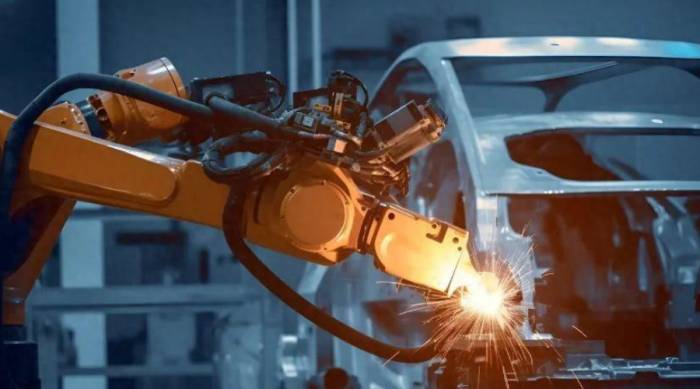Xiaomi SU7 will officially go on sale next week, and it seems that netizens can't wait any longer.
With only 4 days left until the launch of Xiaomi's car, everyone is eagerly awaiting its final price.
According to netizens' reports, even though Xiaomi SU7 has not been officially released yet, the seafood market has already started selling various accessories, including brake calipers, brake pedals, original rear lights, and smart cockpit domain controllers.
Some netizens even joked that those with strong hands-on abilities could assemble a car by themselves, with a cost of less than 100,000 yuan.
According to previous information revealed by insiders, Xiaomi Group has determined the pricing for Xiaomi's car, which has been reduced compared to last year. It is expected that the standard version will start at 266,000 yuan, and the high-end version will start at 336,000 yuan. However, this pricing may still be adjusted before the press conference.
The high and low versions of Xiaomi SU7 are mainly positioned against Tesla Model 3 and Zeekr 001, with not only similar configurations but also a comprehensive price comparison.
Advertisement
Despite the imminent market launch, Lei Jun is still discussing in multiple internal meetings how to make Xiaomi's car attract attention without changing the pricing.
He may offer fan benefits on the day of the press conference, such as deposit deductions (for example, a deposit of 2,000 yuan can be deducted by 6,000, and a deposit of 3,000 yuan can be deducted by 10,000, etc.), but the specific discount has not yet been finalized and will be based on the official announcement on that day.Who are the suppliers for Xiaomi Cars?
As the launch of its first model approaches, the suppliers related to Xiaomi Cars have also gradually emerged. According to a tally by Jiemian News, more than 40 industry chain companies have become partners with Xiaomi Cars.
From the details of the Xiaomi car model application information disclosed by the Ministry of Industry and Information Technology, it can be found that the battery cells for Xiaomi's first pure electric SUV, the SU7, come from CATL and Xiangyang Fudi Co., Ltd., a subsidiary of BYD. They will respectively provide ternary lithium batteries and lithium iron phosphate batteries, both of which are top domestic power battery manufacturers.
The SU7's ABS braking system uses Bosch Suzhou's ESP10, which is the latest generation of Bosch's control system products. The drive motors are provided by Suzhou Inovance Drive Systems Co., Ltd. and United Automotive Electronic Systems Co., Ltd., with the former being a controlling subsidiary of the A-share listed company Inovance Technology, and the latter having a stake held by Bosch.
Regarding the interior and exterior of the car, FAW Fudi stated that several of its subsidiaries have entered the procurement group of Xiaomi Cars, with products including car seats, dashboards, rearview mirrors, and wheel assemblies. Huayu Auto Parts indicated that the company's new car interiors, electric drive aluminum shell covers, drive shafts, front subframes, brake calipers, headlights, and electric air conditioning compressors have been newly supplied to some models of Tesla, NIO, BYD, XPeng Motors, and Xiaomi Cars.
Wanxiang Qianchao stated that the company's quick drive shaft products have been supplied to Xiaomi Cars; Demaishi revealed that one of the company's steering screws is ultimately used in Xiaomi Cars; Shangluo Electronics stated that the company will indirectly supply Xiaomi Cars with electronic components such as resistors, capacitors, diodes, and power chips; and Haosen Shares, a supplier of intelligent production lines and intelligent equipment integration, disclosed that the company has cooperated with Xiaomi Cars as an intelligent production line supplier.

Xiaomi Cars mainly focuses on cooperation with traditional car suppliers, while considering direct investment and shareholding in electrified and intelligent components. According to incomplete statistics, Xiaomi's car-related investments mainly involve the semiconductor, three-electric systems, smart cockpit, and intelligent driving fields. Among them, there are more than 30 investments in the semiconductor field.
In the field of intelligent driving, Xiaomi has successively acquired DeepMotion Technology and invested in many enterprises such as sensors, LiDAR, and millimeter-wave radar, including Hesai Technology and RoboSense, basically achieving a full industry chain layout of intelligent driving.Combining the results of Xiaomi's recent new product launch, the Xiaomi Smart Driving System has already equipped with features such as one-click vehicle summoning, automatic ramp entry, active lane changing and overtaking, unprotected turning/U-turning, and automatic valet parking, covering scenarios like highways, urban areas, and parking lots.
Lei Jun: Xiaomi SU7 test vehicles cost over 2 million each
Lei Jun revealed that the cost of Xiaomi's SUV7 test vehicles was initially quite high, with each vehicle costing over 2 million yuan, before gradually approaching the cost level of mass-produced vehicles.
It is reported that there are a total of 576 Xiaomi SUV7 test vehicles, a massive testing scale that can be said to be the largest in the country. This is also one of the reasons why Xiaomi SUV7 test vehicles are frequently seen in different cities.
The Xiaomi SUV7 has undergone large-scale testing nationwide, covering 300 cities. The testing range spans from the extremely cold Heihe at -40°C to the scorching Turpan at 60°C, crossing a temperature difference of 100°C. It even underwent testing on the Kunlun Mountain Plateau at an altitude of 4768 meters.
Lei Jun disclosed that the senior executives of Xiaomi participated in the road testing of the SUV7 throughout the process, with the cumulative testing mileage exceeding 100,000 kilometers.
Lei Jun himself has personally participated in the testing on multiple occasions, with the longest one being on January 5th of this year, driving from Beijing to Shanghai, a total distance of 1276 kilometers. He drove alone, using the high-speed autonomous driving mode, and including charging and rest, it took a total of over 15 hours.
After such rigorous testing, Lei Jun announced that the Xiaomi SUV7 is ready and will be officially released next Thursday.
Comment Box